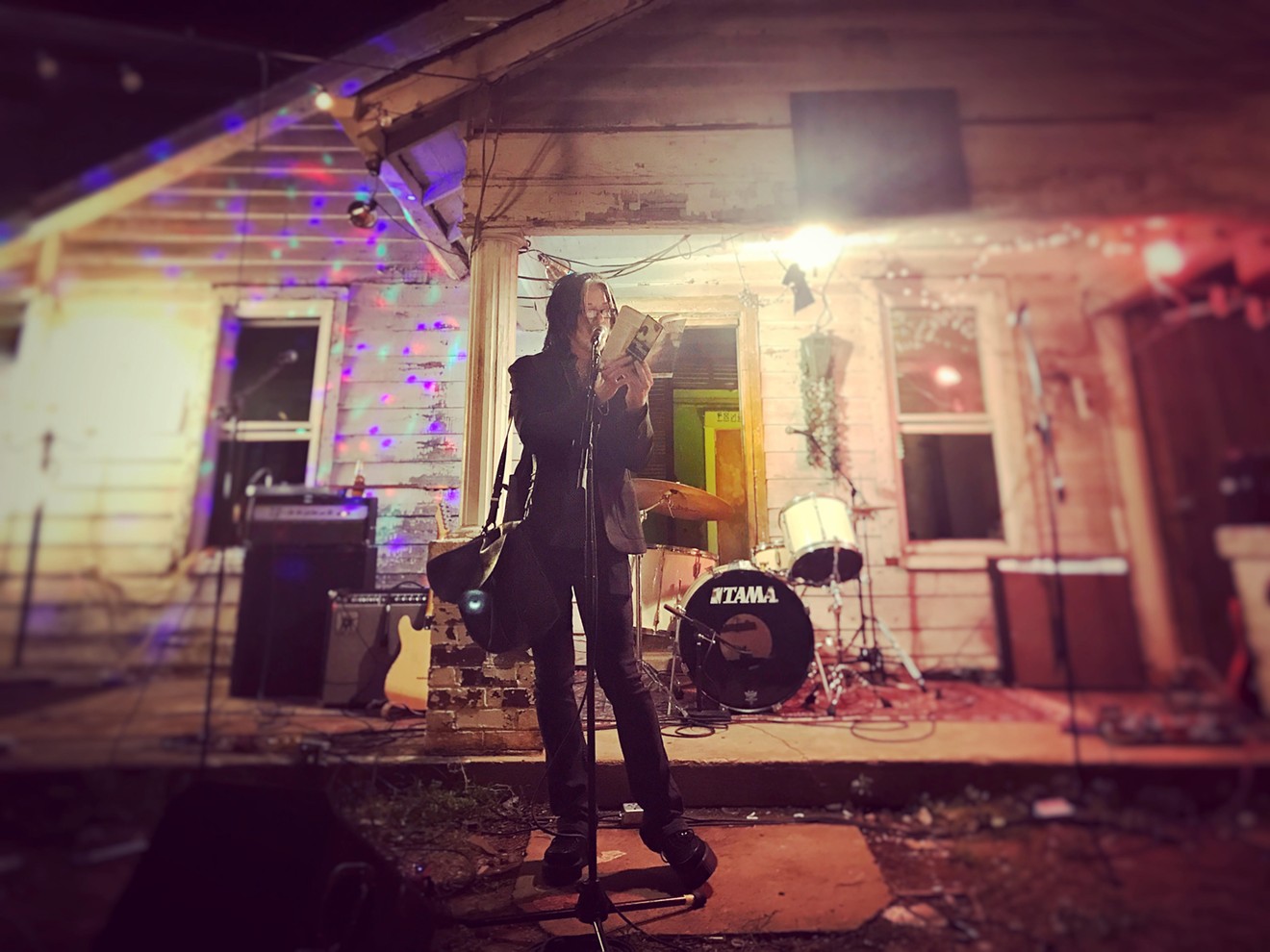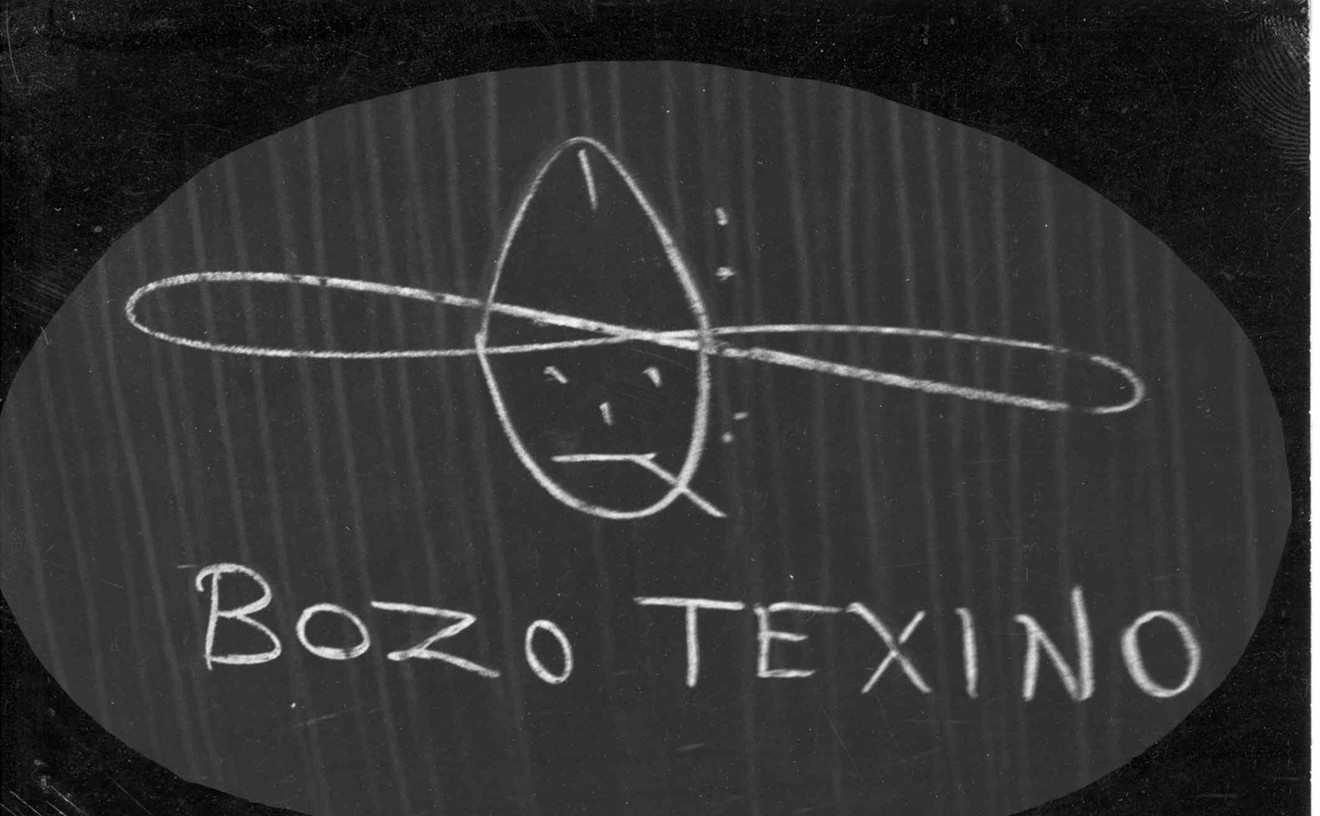Smith, who grew up in Tucson, has been a national-class bicyclist, a rock-and-roll frontman and a journalist; he's also struggled with addictions to alcohol and meth. These experiences fuel Spent Saints, which turns an empathetic eye toward characters living on the margins.
On the third leg of a book tour that's seen him reading in between rock sets, namely, — by the Tough Shits and Rocky Four — as well as leading a writing workshop at a Memphis Boys and Girls Club, Smith will be reading and screening a web series based on the collection at the Boulder Book Store on Tuesday, July 11, at 7:30 p.m.
In advance of the reading, Westword spoke with Smith.
Westword: How did you land on Spent Saints as the title of your collection? Do you consider all the characters, or at least those whose point of view you dip into, spent saints?
Brian Jabas Smith: I have a fascination for Catholic saints. I grew up Catholic, and the great thing about the Catholic Church is that they have these beautiful, sexy saints — hundreds of them. As a kid, I would make saints of people. My favorite sorts of people — I became an addict and an alcoholic — my favorite sorts of people were ones who were really really going to battle over addictions or substance abuses, and they overcame it. They went to war and came back. To me they were spent saints because they were really striving to be good. It’s also a play on Beat Angels. I had a band called Beat Angels, which was a reference to ’50s Beat writers.

A still from the "micro-short" inspired by "Sirens," a short story from Spent Saints and Other Stories.
Sarah Ledbetter and Matteo Servente
Since I didn’t go to school, I had to figure out what worked and what didn’t. Early on, as long as I can remember...I always wanted to be a writer, even if it was journalism. Flannery O’Connor was a big one. And then there were the obvious poets, like Bukowski and Arthur Rimbaud and Paul Verlaine. Charles Bukowski gets kind of a short shrift; I mean, I read him before Hemingway. He taught me that simplicity and writing about the little brutalities of daily life could be super-entertaining. He taught me that the first and foremost thing about writing is being an entertainer.
My favorite contemporary authors are Bonnie Jo Campbell — and she blurbed my book, even, which was real flattering — and Dorothy Allison. A lot of female writers. I like Donald Ray Pollock and Patrick deWitt...but being self-taught, I zeroed in on the things I wasn’t getting in literature, like sustaining a metaphor and understanding scene and style. At 21 and 22, when I was first putting this together, I was in a band, too. I’m sure my bandmates thought I was a pretentious little fuck [laughs], but they put up with me.
I always wanted to be a writer, but it took me forever to do this book. By some miraculous fluke, I got hired at newspapers basically writing pieces that I wanted to write, not necessarily being told what to write.... I did a lot of music and feature writing...I was never told, ‘Oh, you have to go to the city council tonight,’ or ‘You have to go talk to so-and-so lawyer.’ It was, “Go do what you do.’ I have to say, I really learned how to write well not by going up through literary circles, but by working with really good editors, working not at daily newspapers, but at alternative weeklies. That’s where I learned discipline and the beauty of economic sentences.
I imagine that some aspects of journalism have been helpful in writing short stories, but have there been other parts of journalistic writing that you’ve had to willfully work past to write fiction?
Yes. For me it was really easy to slip into that "feature-writing ease." Truman Capote and Tom Wolfe were big influences. Truman Capote was the master; he taught everybody how to write journalistic pieces that read like fiction. I always wanted to be a Truman Capote sort of guy. It sounds silly as hell, but I didn’t go to school. And I got hired at Phoenix New Times, which is a sister of the Denver Westword...and when they hired me, I was still a drunk, still a raving alcoholic. I was strung out on crystal meth, and they didn’t know.
Here’s how journalism saved me. New Times hired me, and literally they lifted me out of the gutter. I was playing in a rock band, and I didn’t have any money. But I was writing, and they loved my writing. They gave me a job, and suddenly I had an adult wage and health insurance for the first time in my life. So I was forced to clean up, because I didn’t want to lose this. I would be dead if.... I was living that whole idea of "drunk and high and playing in a band," this romantic idea of being a writer. I was just playing at it. And then I was legitimized when I got hired full-time.
As someone who’s overcome the addictions you write about in Spent Saints, was it hard to write about addiction — using the substances you now stay away from — and if so, how did you make the choice that, "Okay, this is going to be hard to write about, but I’m going to do it anyway?"
Since this is the first collection of stories, there’s obviously some real biographical signposts. In the book, the character Julian is a journalist, and he’s also in a rock band before that, and before that he’s a superstar athlete, and I’ve done all those things, so I’ve actually stuck to what I knew [laughs]. Yeah, it was really painful to write about this stuff. I’m prone to mad bouts of depression anyway, and I can get suicidal. I don’t know if you have much experience with depression, but it’s not much fun. To talk about it, it feels really self-glorifying in a way.... I didn’t want to slip into any of that writing these stories. But it was really painful because it was full of triggers.
Here’s the thing: I’ve read other stories and other novels written about crystal meth, and I always thought it was done really poorly. The characters were 95 percent of the time sort of parodic; the characters were being made fun of. There’s so much fiction that came out after 1995 that dealt with crystal-meth addictions, and it was all done in a way that didn’t ring true to me, and I really was strung out on crystal meth. I tried to write some of those stories from a point of view of what it’s really like. I’m hoping I succeeded, because I didn’t want it to be like, ‘Oh here’s another writer with an MFA pretending to know what it’s like to be strung out for days-on-end on crystal meth and jerking off to porn and shutting himself or herself off from the world.’ Because that’s what you do on crystal, and ultimately, you just want to die...I wouldn’t even know where to begin if I didn’t know about it, and I don’t know how anybody can. I wasn’t strung out on heroin, so I couldn’t write about being strung out on heroin...You have to know it. My whole thing was it had to ring true.
But to answer your question, I really wanted to get high again, and I really wanted to drink again. I was in a place, writing those stories, a really sort of low, hollow, desperate point in my life. Cause all I had were these stories, and I thought nobody would read them, and I was laid off from my job, and it was actually really hard to do because I didn’t want to live much longer. It sounds so dour, saying it out loud. I really did want to get drunk and get high, writing some of those passages. But I didn’t, because I know that if I do, there’s no turning back. That sounds like a Twelve Step cliché, or an addict’s cliché, but...yeah.
So you wrote it because it was what you knew and because you wanted to remedy these portrayals that seemed inauthentic.
Absolutely. Yeah.

A scene of withdrawal from the film "micro-short" inspired by "Old Ladies in Church Hats," by Brian Jabas Smith.
Curtis Endicott
It was actually going to be a novel, but I was really depressed writing, and I didn’t have the patience. I thought short stories would be quicker. I remember Raymond Carver saying that he never wrote a novel because once he started writing, he had to get the stories done. I understood that. I also had this fear that nobody would want to read a novel that I wrote, but somehow they would want to read short stories [laughs]...
I enjoyed seeing how the different characters’ lives were interrelated throughout.
Thank you. I was second-guessing throughout. I didn’t want to be accused of having male gaze; I didn’t want the character Serena to come off as, "Oh, here’s how a female character is portrayed by a male writer." I didn’t want the whole thing to dive into junkie or drug-addict porn. I tried to insert a certain amount of empathy and realism so as to avoid those pitfalls. I’ve read so many drug-addict books, and it’s a cliché. And I tried to do my best to avoid that, but I felt I had to write this to get it out of my system.
Brian Jabas Smith will read from Spent Saints & Other Stories at 7:30 p.m., on Tuesday, July 11, at the Boulder Book Store. The event will include a screening of select episodes from the web series; vouchers to attend are $5 and can be purchased at the bookstore, at 303-447-2074, or at the door. For more information on Spent Saints & Other Stories, including the companion "micro-shorts," visit spentsaints.com.












